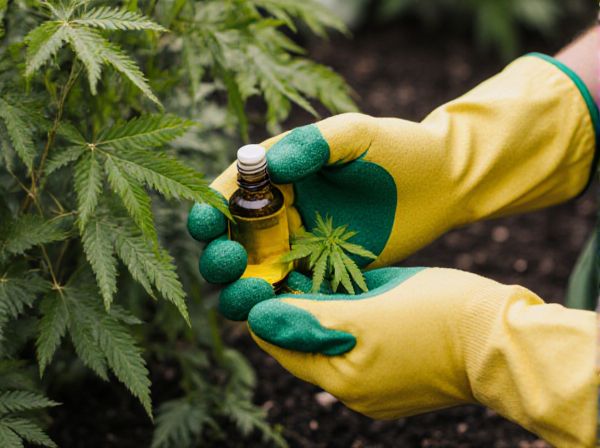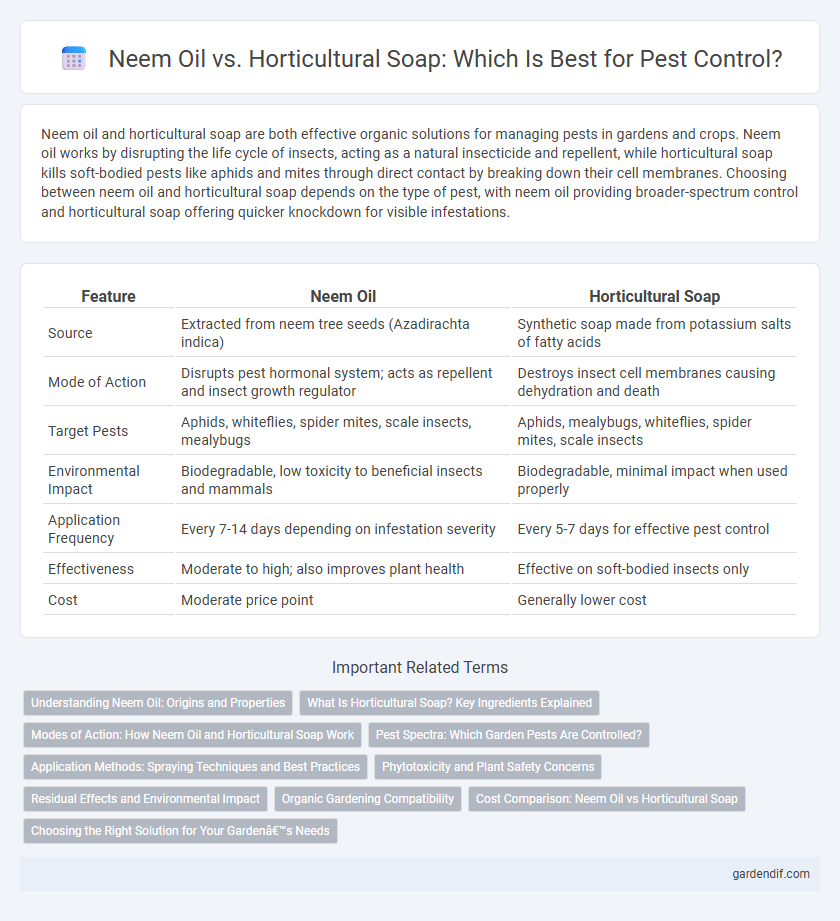
Neem oil vs Horticultural soap Illustration
Neem oil and horticultural soap are both effective organic solutions for managing pests in gardens and crops. Neem oil works by disrupting the life cycle of insects, acting as a natural insecticide and repellent, while horticultural soap kills soft-bodied pests like aphids and mites through direct contact by breaking down their cell membranes. Choosing between neem oil and horticultural soap depends on the type of pest, with neem oil providing broader-spectrum control and horticultural soap offering quicker knockdown for visible infestations.
Table of Comparison
| Feature | Neem Oil | Horticultural Soap |
|---|---|---|
| Source | Extracted from neem tree seeds (Azadirachta indica) | Synthetic soap made from potassium salts of fatty acids |
| Mode of Action | Disrupts pest hormonal system; acts as repellent and insect growth regulator | Destroys insect cell membranes causing dehydration and death |
| Target Pests | Aphids, whiteflies, spider mites, scale insects, mealybugs | Aphids, mealybugs, whiteflies, spider mites, scale insects |
| Environmental Impact | Biodegradable, low toxicity to beneficial insects and mammals | Biodegradable, minimal impact when used properly |
| Application Frequency | Every 7-14 days depending on infestation severity | Every 5-7 days for effective pest control |
| Effectiveness | Moderate to high; also improves plant health | Effective on soft-bodied insects only |
| Cost | Moderate price point | Generally lower cost |
Understanding Neem Oil: Origins and Properties
Neem oil, extracted from the seeds of the Azadirachta indica tree native to India, contains bioactive compounds such as azadirachtin that disrupt insect growth and reproduction. Its natural antifungal, antibacterial, and insecticidal properties make it an effective organic pesticide against a wide range of pests including aphids, whiteflies, and spider mites. Unlike synthetic chemicals, neem oil acts as a systemic deterrent with low toxicity to beneficial insects and mammals, enhancing sustainable pest management practices.
What Is Horticultural Soap? Key Ingredients Explained
Horticultural soap is a pest control solution composed primarily of potassium salts of fatty acids, which effectively target soft-bodied insects like aphids and whiteflies by disrupting their cell membranes. Unlike neem oil derived from Azadirachta indica seeds containing azadirachtin, horticultural soap relies on these fatty acid salts to suffocate pests without residual toxicity. This makes horticultural soap a biodegradable and environmentally friendly option for integrated pest management in gardening and agriculture.
Modes of Action: How Neem Oil and Horticultural Soap Work
Neem oil disrupts insect hormone systems, inhibiting growth and reproduction by blocking molting and feeding behavior in pests like aphids and mites. Horticultural soap works by penetrating the pest's outer coating, causing cellular disruption and dehydration that leads to death, primarily targeting soft-bodied insects such as whiteflies and spider mites. Both treatments provide effective pest control through distinct biochemical mechanisms without harming plants.
Pest Spectra: Which Garden Pests Are Controlled?
Neem oil effectively controls a broad spectrum of pests including aphids, whiteflies, spider mites, and scale insects by disrupting their growth and reproduction. Horticultural soap primarily targets soft-bodied insects such as aphids, mealybugs, and spider mites through direct contact, causing membrane damage and dehydration. Both substances are safe for beneficial insects when used correctly but differ in their pest spectra and modes of action.
Application Methods: Spraying Techniques and Best Practices
Neem oil and horticultural soap are commonly applied through foliar spraying, targeting pest-infested areas while avoiding runoff into soil to maximize effectiveness. For neem oil, use a fine mist spray in early morning or late afternoon to prevent leaf burn and ensure thorough coverage on both leaf surfaces. Horticultural soap requires frequent applications every 7-10 days, focusing on direct contact with pests, using a pressure sprayer for even distribution and avoiding spraying during peak sunlight to reduce phytotoxicity risks.
Phytotoxicity and Plant Safety Concerns
Neem oil and horticultural soap differ significantly in phytotoxicity and plant safety, with neem oil often posing a higher risk of leaf burn and stromal damage due to its potent bioactive compounds like azadirachtin. Horticultural soap, composed primarily of potassium salts of fatty acids, generally exhibits lower phytotoxic effects, making it safer for sensitive plants when applied at recommended concentrations. Both require careful application in early morning or late afternoon to minimize sunlight-induced phytotoxicity, but neem oil's complex chemical profile demands stricter adherence to dilution guidelines to avoid adverse plant reactions.
Residual Effects and Environmental Impact
Neem oil exhibits longer residual effects due to its active compound azadirachtin, which disrupts insect growth and feeding over several days, making it effective for prolonged pest control. Horticultural soap acts quickly by dissolving insect exoskeletons but has minimal residual activity, requiring more frequent applications. Neem oil is biodegradable and poses low toxicity to beneficial insects and pollinators, while horticultural soap's residues break down rapidly but can be more harmful to soft-bodied beneficial insects if overused.
Organic Gardening Compatibility
Neem oil and horticultural soap are both highly compatible with organic gardening practices due to their natural, biodegradable ingredients that minimize environmental impact. Neem oil offers broad-spectrum pest control, targeting a variety of insects and fungal issues without harming beneficial insects, while horticultural soap effectively manages soft-bodied pests like aphids and mites by disrupting their cell membranes. Both products enhance plant health organically, aligning with sustainable gardening goals and ensuring minimal chemical residue in edible plants.
Cost Comparison: Neem Oil vs Horticultural Soap
Neem oil typically costs between $10 to $20 per quart, offering a concentrated formula that can be diluted for multiple applications, making it cost-effective for long-term pest control. Horticultural soap generally ranges from $8 to $15 per quart but may require more frequent applications due to its faster breakdown on plant surfaces. Considering dilution rates and application frequency, neem oil often presents a more economical option over time despite a higher initial price.
Choosing the Right Solution for Your Garden’s Needs
Neem oil effectively controls a wide range of pests including aphids, whiteflies, and spider mites by disrupting their life cycle and acting as a natural insecticide and fungicide. Horticultural soap targets soft-bodied insects and works by suffocating pests on contact, making it ideal for immediate pest management without residual effects. Choosing between neem oil and horticultural soap depends on the severity of infestation, pest types, and the garden's ecological sensitivity, ensuring targeted and sustainable pest control.
Neem oil vs Horticultural soap Infographic

 gardendif.com
gardendif.com